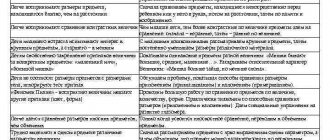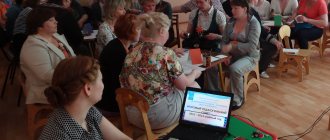Prospects for the development of education in Russia
Prepared by Zubkova Irina Vladimirovna
Teacher-psychologist, State Budgetary Educational Institution “School in Nekrasovka”
“Prospects for the development of education in Russia in the process of digitalization.”
Recently, digital education has become increasingly popular. This is now connected not only with the technical and digital development of society, but also with the need for learning in conditions of self-isolation. Here we can note a definite plus for those who are forced to sit in quarantine for two weeks, who do not have the opportunity to study face-to-face and can study in another way. There are also undeniable disadvantages: correspondence/online/distance/electronic education deprives teachers of an important component - personal interaction, quick response, correct feedback.. Much becomes dependent not on the personality and skills of the teacher, but on the technical capabilities of each participant (availability of a laptop). each student, the presence of a stable and good Internet connection, etc.).
What prospects await us at each level of education?
The most active process of digitalization and computerization occurs at higher levels of education: higher education institutions, technical schools, colleges, as well as in high school. This is primarily due to the personality characteristics of students. For remote, online or electronic work, not only good knowledge of technical devices is important, but also a high level of self-organization and self-control. It is very important that students can not only enter the desired conference themselves and join classes, but also treat this with full responsibility. In face-to-face lessons, students are supervised by teachers who prevent them from being distracted and monitor the completion of assignments; in distance learning, students are most often left to their own devices (since parents are often at work at this time). The level of self-discipline and self-organization is higher among more mature individuals, therefore, at higher levels of education, this option of interaction (remote) and the use of digital technologies is quite appropriate. Vocational educational institutions are undergoing the largest percentage of digitalization (including the use of completely distance learning).
The digitalization process is also increasing at the school education level. In large and more developed cities, electronic boards and electronic systems are used, such as the “Electronic Moscow School” and others. Recently, due to the unfavorable epidemiological situation, more and more school events are being held remotely (olympiads, classes, meetings, competitions). There are often cases of distance learning for entire classes when they are closed for quarantine. There is a division into several groups: primary school and primary and high school. The process of distance/electronic learning often affects primary and secondary schools. From our experience, we know that during the period of exacerbation of the disease, the first classes that were closed for quarantine and/or transferred to distance learning were the upper grades; the elementary grades studied in person more often and longer.
The digitalization process has also affected the preschool level of education. There are periods when preschool groups are closed for quarantine or switch to distance education. At this level, the biggest problems with the organization of training and education are observed. Research by Tarasova N.V. showed that “preschool teachers traditionally have a confident command of visual means of organizing the process of cognition, are able to organize children’s play and support children’s initiative, creatively use any junk, improvised, etc. material in stimulating children's activity. However, the majority of them do not master digital technologies, experience technical difficulties in independently using digital tools in the educational process, and are often conservative in their use.” [5]. There are also great difficulties in organizing the group’s transition to quarantine: whether there will be distance learning or e-learning or other formats. According to Art. 10 clause 2 of the Federal Law of December 29, 2012 N 273-FZ (as amended on April 24, 2020) “On Education in the Russian Federation”, preschool education is the first level of general education, and Art. 16 clause 2 normatively establishes the right, including preschool educational organizations, to use e-learning and distance learning technologies in the implementation of educational programs. However, most constituent entities of the Russian Federation closed preschool educational institutions, and for parents working in organizations from the list of Decree of the President of the Russian Federation No. 239 of April 2, 2022, duty groups were organized in kindergartens. Duty groups are most often for those children whose parents both work and there is no one to leave the child with. At this stage, many other difficulties are noted in distance or electronic education: it is difficult to monitor the completion of tasks, the inability to conduct a lesson taking into account all the features of this lesson and the assigned tasks (for example, physical education or music). For a child of preschool level, it is problematic to sit still for half an hour. According to SanPin, there are requirements only for children 5-6 years old (SanPiN 2.4.1.3049–13 (clause 4.20): no more than one lesson per day and no more than three times a week. The duration of classes was 10 minutes for children 5 years old and no more 15 minutes for children 6 years old (SanPiN 2.2.2/2.4.1340–03), this time is not enough to conduct a normal lesson. The effectiveness of these classes sharply decreases and without the participation of adults/parents of children, conducting these classes becomes simply impossible.
Another level of education is additional education and clubs. This level also has its own characteristics. Firstly, the dependence on the age of students (as in the example of educational institutions), and the dependence on the specifics of additional education. Theoretically, it is possible to conduct classes remotely in all clubs and in all additional education, but the effectiveness of each of them will be different. For example, handicraft clubs can be conducted through online broadcasts or video lessons; in gymnastics, you can also let children study the theory (for example, body structure, muscles), but teaching children to perform tricks remotely is simply not possible, and besides, it’s dangerous, this is the type of activity in which it is simply necessary for the coach to be next to the student (for backup and other things). Here we can see that, depending on these features, there are even entire online learning schools, clubs, YouTube channels, and there are those areas that cannot be distance learning in principle.
We have discussed with you what is happening with the process of digitalization of education at each stage, but what are the prospects, taking into account the features that we listed above?
Based on the changes and problems that have not yet been resolved, we can conclude that higher levels of education and senior grades will be subject to greater digitalization (various technologies will be actively introduced and used here: distance learning and e-learning, the use of various technologies and programs) . Earlier stages, namely preschool and primary school levels of education, will be affected by this process a little less: due to the impossibility of full-fledged learning with distance/electronic learning and the huge dependence on the presence of adults next to children directly in the learning process. Here, only new technologies and teaching techniques used by teachers in face-to-face classes will be introduced more (for example, a digital mobile laboratory for growing plants, or the use of cartoons and presentations).
Literature:
- Askhadullina Nailya Nurgayanovna, Eremina Anastasia Pavlovna RETROSPECTIVE ANALYSIS OF DIGITALIZATION IN EDUCATION // Problems of modern pedagogical education. 2022. No. 69-4. URL: https://cyberleninka.ru/article/n/retrospektivnyy-analiz-tsifrovizatsii-v-obrazovanii (date of access: 11/11/2021).
- Ayuchenko Alena Evgenievna FACTORS AFFECTING THE FORMATION AND DEVELOPMENT OF A DIGITAL EDUCATIONAL ENVIRONMENT IN A PRESCHOOL ORGANIZATION // Scientific interdisciplinary research. 2022. No. 3. URL: https://cyberleninka.ru/article/n/faktory-vliyayuschie-na-stanovlenie-i-razvitie-tsifrovoy-obrazovatelnoy-sredy-v-doshkolnoy-organizatsii (date of access: 11/11/2021).
- Kashitsin V.P. Study of the digitalization process in the Russian general education system // Domestic and foreign pedagogy. 2020. No. 3 (68). URL: https://cyberleninka.ru/article/n/issledovanie-protsessa-tsifrovizatsii-v-sisteme-obschego-obrazovaniya-rossii (date of access: 11/11/2021).
- K. Yu. Krasnoshchek, S. N. Sychanina Problems and prospects for the development of preschool education in the Russian Federation // International Journal of Humanities and Natural Sciences. 2022. No. 10-1. URL: https://cyberleninka.ru/article/n/problemy-i-perspektivy-razvitiya-doshkolnogo-obrazovaniya-v-rossiyskoy-federatsii (date of access: 11/11/2021)
- Article Preschool education system during a pandemic Authors: Tarasova N.V., Director of the Research Center for Socialization and Personalization of Children's Education FIRO RANEPA, Ph.D., Associate Professor; Pestrikova S.M. deputy Director of the Center for Information Policy and Marketing of Educational Projects. El access https://firo.ranepa.ru/novosti/105-monitoring-obrazovaniya-na-karantine/826-ekspertiza-do-rez-oprosa
Trends in education development
In conditions of individualization of learning, modern education must be continuous. The need for continuing education arises both in connection with the need of people to constantly replenish their knowledge in the process of professional activity, and in connection with the progress of science and technology.
Innovations in education are relevant and systemically self-organizing innovations that are the result of various initiatives and innovations that become promising for the evolution of education and have a positive impact on the development of all forms and methods of education. The concept of innovation, in relation to the development of modern education, can be considered as a purposeful transformation of the content of education and the organizational and technological foundations of the educational process, aimed at improving the quality of educational services, the competitiveness of educational institutions and their graduates, and ensuring the comprehensive personal and professional development of students. Innovations in the Russian education system are natural; their content, forms and methods of implementation depend both on global problems of human development and on socio-economic, legal, spiritual and political processes of reforming Russian society. Social innovation is based on the modernization and informatization of Russian education. The main goal of modernization of education is to create a mechanism for the sustainable development of the educational system, ensuring its compliance with the challenges of the 21st century, the socio-economic needs of the country's development, the requirements of the individual, society and the state. Modernization of Russian education is an innovative process of transforming the entire education system, aimed at maximizing the educational needs of students in a wide range of specialties, levels of education, educational institutions and information and educational resources.
At the same time, education must achieve the expected effect regardless of the location of both the student and the educational resource or service needed by the student, and be carried out using the most modern information and telecommunication technologies. The result of modernization should be the achievement of a new quality of Russian education, determined, first of all, by its compliance with the current and future requirements of modern life in the country. Informatization of education is aimed at implementing the idea of improving the quality of education content, conducting research and development, its implementation, and involves replacing traditional information technologies with more effective ones in all types of activities in the national education system in Russia.
The introduction of innovative technologies in education requires new approaches to learning based on modern educational technologies. Educational technology is the purposeful application in education of a system of means that determines the acquisition of certain characteristics of an educational phenomenon (certain qualities of graduates, content of education, professional development of teachers, etc.). Modern educational technologies should primarily serve creative education and contribute to the creative development of the personality of each student.
Educational technology includes a set of actions related to any educational processes (management of the educational system, development of an educational institution, training of teaching staff, etc.). The structure of educational technology includes such components as goal setting, control and evaluation, and information technology is the basis of the modern educational system. It is important that innovative technologies in education require not only the development of education based on information technology, but also the creation of an appropriate information and educational environment.





